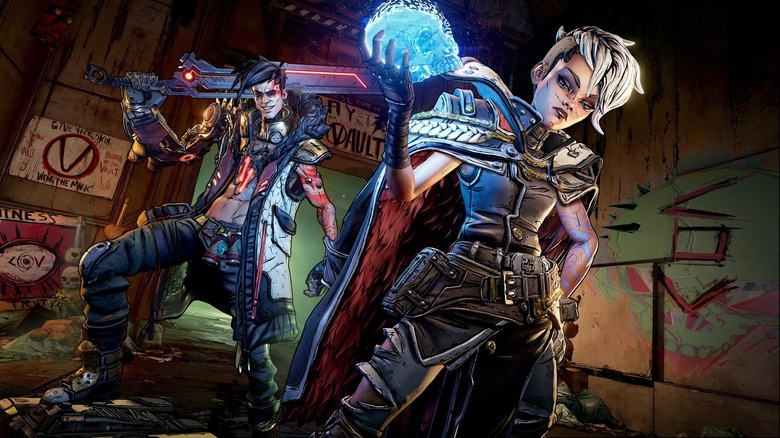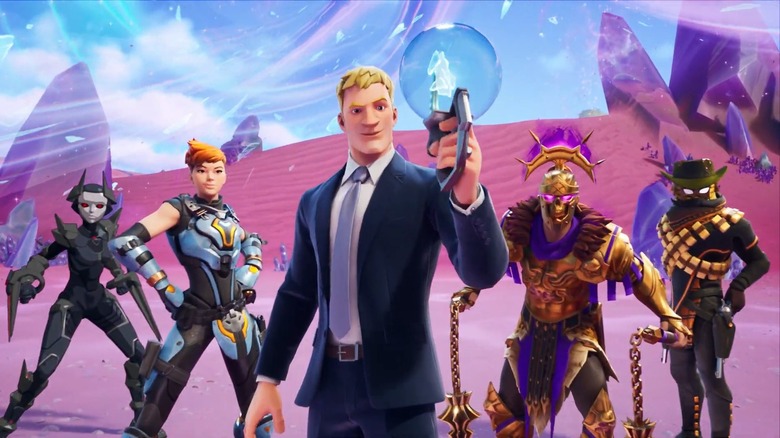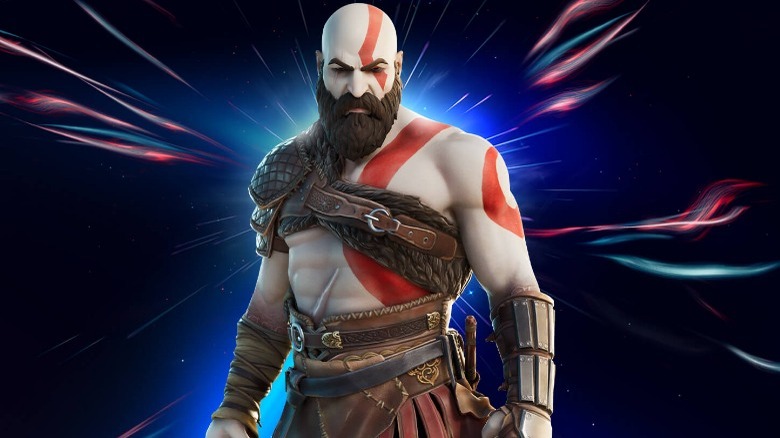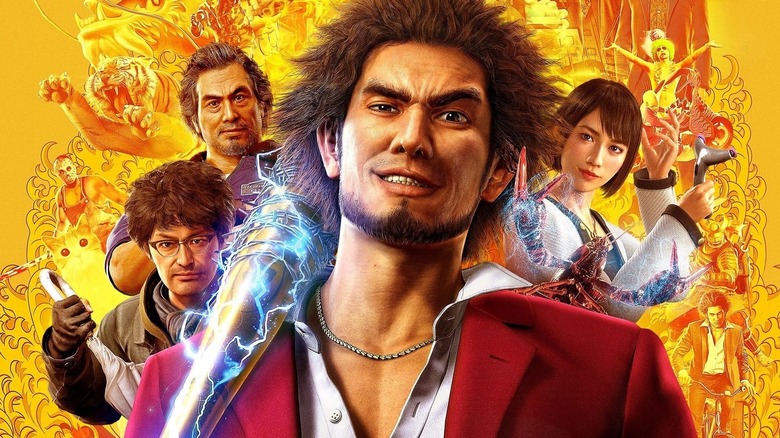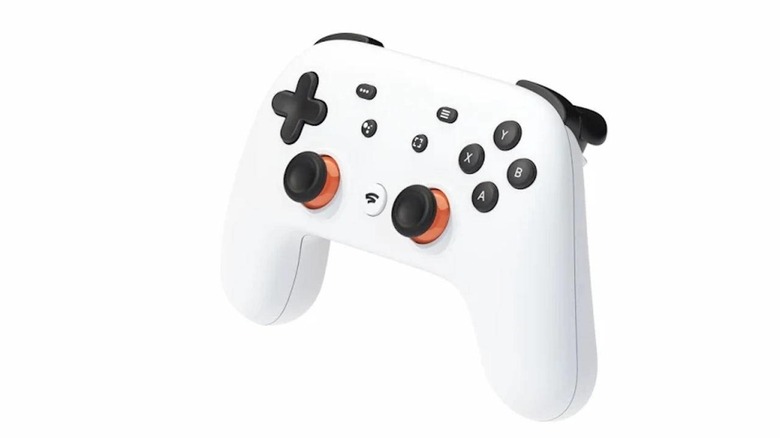The Most Eye-Opening Moments From Epic's Court Battle With Apple So Far
The ongoing Epic Games v. Apple court battle has been a long time coming. What started with Apple removing "Fortnite" from the app store has built to an avalanche. This excision led to a civil antitrust lawsuit (and a cheeky "Fortnite" in-game event, complete with evil apple-faced skins) and eventually ballooned into countersuits and counter-countersuits that involved the Federal Court of Australia. One legal system battleground just wasn't big enough for these titans of industry.
Apple CEO Tim Cook, as well as several of the company's executives, are set to meet Epic Games in court and testify against the studio, and while the trial has only just started, it has already provided a ton of surprise reveals. None of these eye-opening moments have broken the case wide open, but they are the kinds of bombshell events you would expect to be accompanied by the Cornered theme from "Phoenix Wright: Ace Attorney."
Since the trial is ongoing, expect more shocking confessions and courtroom-drama-worthy events to unfold, but here are the most mind-blowing ones so far.
Epic Games threw too much money at its digital storefront
These days, it seems every entertainment brand has its own proprietary platform. Just as television networks and movie studios have streaming services, game publishers have digital distribution programs. Epic Games threw its hat into that already-crowded ring with the Epic Games Store, and the company thought it could out-profit the competition by investing some serious money in its platform. All that won Epic Games was a sizable hole in its wallet.
The Epic Games Store has two claims to fame (or infamy, depending on how you look at things): free games and exclusives. Epic Games has spent a pretty penny on both. According to Epic Games v. Apple court documents, Epic spent $1.4 million on "Subnautica" to give the game away for free. The storefront went on to offer hundreds of other titles for free — including "Alien: Isolation," "Grand Theft Auto V," and "Star Wars Battlefront 2" — which resulted in 5 million new accounts and a deficit of $11.9 million.
By the estimates of "The Washington Post," the Epic Games Store cost Epic Games $359 million dollars from 2018 to 2019. According to Gamespot, even in 2021, the platform has yet to turn a profit, but Epic Games CEO Tim Sweeny claimed the store has been profitable, at least in terms of popularity and clout. If you're going to make an expensive omelet, you likewise need to break a few costly eggs.
The truth about microtransactions and young players
Judge Yvonne Gonzales Rogers said the quiet part out loud during the second day of court proceedings in the Epic v. Apple trial. Adi Robertson, a senior reporter at The Verge, covered court proceedings and explained the exchange on her Twitter account. Robertson explained that one of the biggest issues of the day involved the demographic that typically plays "Fortnite." That's right, the screaming younger "Fortnite" fans, the same ones who chased megastar streamer Ninja away from the game, were at the heart of day 2's proceedings.
As established previously, Epic wanted a way for players to purchase V-Bucks on iOS platforms without going through Apple first. Judge Rogers asked, "Isn't that a responsible way to deal with a young client base? Why should we want them to have the ability to just impulse buy something?" Tim Sweeney claimed that providing a way for players to easily purchase V-Bucks was part of Epic's plan to provide "customer convenience."
According to a report from 9to5Mac, Sweeney also admitted that if Apple had offered a special deal to Epic, the company would have taken it — even if it wasn't offered to other developers. The ability to offer V-Bucks easily, without going through the Apple App Store, seemingly outweighed the possible issue of children being able to easily spend real-world dollars.
Sony charged publishers for permission to enable cross-play
The world is becoming increasingly more interconnected and insular at the same time. While audiences can stream and download new movies, TV shows, and games without setting foot in a store, one could be forgiven for thinking it sometimes feels like intellectual property owners are hoarding their media collections into fiefdoms and don't want to share. Most of the gaming industry is open to the idea of freely letting gamers play with others regardless of platform via cross-play, but according to Epic Games' court documents, Sony only wanted to engage in that practice if they could profit from it.
A collection of emails, as well as testimonies from Tim Sweeny, revealed that Epic Games worked long and hard to add cross-play functionality to the PlayStation 4 version of "Fortnite." Sony adamantly clung to its initial refusal, but Epic's Vice President Joe Kreiner offered marketing data that demonstrated cross-play would be a "win/win." He even offered to "make Sony look like heroes." Sony's response? Money, please. Okay, not literally, but that was the jist of it.
According to Sweeny, Sony forced Epic to pay a cross-play fee as part of its "Cross-Platform Revenue Share" policy. Any publisher that wanted the feature on a PS4 port had to pay the price, and the bigger the playerbase, the steeper the fee. While Sony was an equal opportunity cross-play expense charger, it was also the only one, as far as Sweeny knows.
Epic Games hates xCloud (and Microsoft) almost as much as it hates Apple
Apple initially removed "Fortnite" from its app store because it didn't like the idea of gamers purchasing V-Bucks in iOS versions of the game without going through the Apple App Store first (which precluded Apple from collecting a 30% cut of those transactions). Google followed suit because the game bypassed the Google Play Store as well. This one-two pincer attack has apparently left Epic Games distrustful of services owned by other companies, including streaming services such as Microsoft's xCloud.
During the ongoing Epic Games v. Apple proceedings, Epic released a 321-page document (most of which has been redacted), part of which revealed that the company intentionally refused to release "Fortnite" on xCloud. While the game is available on the streaming service Nvidia GeForce Now, Epic skipped over xCloud because the company viewed the platform as a form of competition.
The Verge postulated that while xCloud itself is unrelated to Apple and the ongoing lawsuit, Epic's decision is inextricably linked to both since Microsoft "doesn't currently allow rival game stores on Xbox or xCloud." Remember, "Fortnite" was kicked off the Apple App Store and Google Play Store because it offered a built-in "rival game store," so Epic Games might have taken that as a cue to avoid other platforms with similar outlooks, including xCloud.
The PS4 is Fortnite's most lucrative platform
Since Epic Games is willing to take Apple to court over the iOS version of "Fortnite," you might think that a ton of money is on the line. That is actually not the case ... sort of. The port was profitable, but it wasn't the most profitable version of "Fortnite" out there. Turns out many audiences would rather play the game on consoles, and you know what they say: With great playerbases comes great profit.
While Epic Games earned over $700 million from the iOS version of "Fortnite" (via CNET), The Verge revealed that the PlayStation is where the V-Bucks is at. According to court documents, the iOS port's millions of dollars' worth of profits made up a paltry 7% of the game's total revenue. 18.7% came from the collective forces of Android, Nintendo Switch, and PC versions, while the Xbox One raked in 27.5%. That means the PS4 was the true cash cow of "Fortnite," accounting for a whopping 46.8% of the game's profits. That was just from March 2018 to July 2020.
A recent court document stated that in 2020, the iOS port of "Fortnite" drew in even less profit (5.8%, with the Xbox accruing 24% and the PS4 delivering around 40%). But, lost profit in the hundreds of millions is still lost profit in the hundreds of millions, even if it is a comparable drop in the bucket.
A botched call causes disorder in the court
On May 3, the Epic Games v. Apple trial officially started, but since the world hasn't quite recovered from the COVID-19 pandemic, it was held remotely. Unfortunately, many companies and organizations still haven't gotten used to the technology necessary for remote calls, courts included. This resulted in a conference call that was initially auditory anarchy, which is never conducive to a proper trial.
As reported by The Verge, the proceedings provided a public call line. Anyone who wanted to listen to the trial was welcome to do so. In an ideal world, this would have offered a one-way line for callers to hear the proceedings. Instead, trial participants were slammed with callers adding their own two cents. This unwanted interruption derailed the trial significantly. A one-minute sample saved for posterity by Twitter user Nicholás Rivero provides a glimpse into the chaos, which included people screaming stuff like, "I would s**k all of you to get 'Fortnite' mobile back," spamming audio clips, and being an overall nuisance.
Court clerks needed 15 minutes to mute the "Fortnite" fans so the trial could begin as intended. But for those 15 cacophonous minutes, the digital court was transformed into a court of public opinion that was weighing overwhelmingly in the favor of Epic Games ... and memes.
We might have the court battle to thank for free Xbox multiplayer
On March 26, Microsoft finally gave audiences the news they had wanted for years. No, "Scalebound" wasn't uncanceled; Xbox owners could finally play free-to-play games without an Xbox Live Gold subscription. That meant gamers could play "Apex Legends," "Call of Duty: Warzone," and (you guessed it) "Fortnite" without a monthly fee. Given recent developments and documents in the Epic Games v. Apple case, audiences might have the ongoing lawsuit to thank. Well, the catalyst for the lawsuit, anyway.
Recently, sites like Kotaku and The Verge unveiled a telling email conversation between Tim Sweeny and Executive Vice President of Gaming at Microsoft Phil Spencer. Way back in 2020, Sweeny asked Spencer to unshackle Xbox free-to-play multiplayer from Xbox Live Gold subscriptions, not unlike how Sony doesn't ask audiences to pay for a PS Plus subscription to use free-to-play multiplayer games. Sweeny wanted the subscriptionless service to hit Xbox consoles on August 27, the launch date of "Fortnite" Season 14 and several days after Epic planned to update the game with the payment system that started the lawsuit.
While Microsoft didn't remove the subscription requirement on Epic's proposed schedule, it probably wouldn't be a stretch to assume that Sweeny's suggestion might have sown the idea of a subscription-free "Fortnite" future that's bloomed.
Microsoft doesn't profit from Xbox consoles, just Xbox games and subscriptions
To a lot of companies, the bottom line is king. If you can't make a profit off a product, why bother making it? Given the number of microtransactions in video games these days, you might assume that most game publishers hold this idea in high regard. According to a recent testimony in the Epic Games v. Apple trial, however, Microsoft has realized that if you're going to make money from video games in the long-run, sometimes you need to take a short-term loss.
During the trial, Epic and Apple called numerous third-party witnesses, including Head of Business Development at Xbox Lori Wright. According to Protocol, Wright was questioned by Epic's lawyer Wes Earnhardt, who asked her point blank how much the company makes on Xbox consoles. Wright responded matter-of-factly, "We don't. We sell the consoles at a loss."
Wright then elaborated that Microsoft counters this confounding-but-purposeful business model by "subsidizing it with game sales and subscription services" to provide an "end-to-end consumer experience." The company has done this since the OG Xbox, and it will probably continue to do so until it leaves the console market.
Apparently, Wright's testimony was supposed to bolster Epic's argument that a 70-30 revenue split only makes sense on consoles like Xbox and PlayStation, because that is where the real money is. According to Epic (via The Verge), Apple sells its iPhones and iPads at a profit, so it doesn't need the same cut of app sales as companies that lose money on physical hardware.
Apple wanted even more from Netflix — and seemed willing to offer preferential treatment
Usually, a company with a digital distribution platform holds the bargaining chips. If a publisher or developer wants their product hosted on the digital storefront, they have to play by the hosting company's rules. However, sometimes the shoe is on the other foot, and the company feels like it has to kiss that shoe to keep the publisher happy. Situations like these could potentially disrupt Apple's stance in the ongoing lawsuit.
Recently, 9To5Mac relayed emails and presentation documents from the Epic Games v. Apple case that revealed "Fortnite" isn't the first time Apple has faced in-app purchase problems. In 2018, Netflix wanted to prevent new users from signing up for subscriptions directly in its iPhone app, and the company started the process with a simple focus test. This decision made Apple scramble to keep the in-app subscription purchases.
According to court documents, Director of App Store Business Management at Apple Carson Oliver initially suggested "punitive measures," but other Apple execs thought it would be better to placate Netflix in return for continued in-app purchase support. Ideas ranged from bundling Netflix with Apple services to letting Netflix determine which shows Apple TV could provide. Apple has seemingly never bent over backwards like this for another company.
Despite Apple's attempts, Netflix patched out the ability to purchase and renew Netflix subscriptions in its iOS app. However, unlike "Fortnite," Netflix is still available on Apple's app platform, with nary a "punitive measure" in sight.
Nintendo says no to the Yakuza
In the early days of the trial, several titans of the gaming industry were called upon to explain their business practices in full. Because of that, a highly-redacted internal document from Nintendo found its way onto the internet. Although a good deal of the information in the doc is pretty standard stuff, the papers did reveal one interesting fact: Nintendo wants everyone to know that it will not work with the Yakuza.
Stephen Totilo of Axios Gaming noticed a section of the document titled "Anti-Social Forces," which described Nintendo's refusal to work with any parties that engage in violent crime. Moreover, Nintendo will terminate contracts with any developers or companies that are found to have any ties to organized crime.
You'd be right to wonder why Nintendo decided to get so specific about this new rule, but it actually makes a good deal of sense. Back in the company's early days as a playing card manufacturer, Nintendo's products were often found to be tied to gambling and other underground activities. Since numbered playing cards were banned in Japan for quite some time, Nintendo's Hanafuda cards were literally the only game in town.
Now, Nintendo wants to officially shed those unsavory ties and move forward as a family-friendly company. It's just so weird that it took the Epic v. Apple case to bring Nintendo's anti-Yakuza stance to light.
The Division 2 pushed Epic to beef up security
A series of emails shared in the trial have revealed that "The Division 2," Ubisoft's popular looter shooter, apparently suffered from a disproportionate rate of fraud when compared to all other titles on the Epic Games Store.
PC Gamer reported that Epic introduced new security features like email verification and two-factor authentication while a great deal of turmoil was going on behind the scenes. What looked like a perfectly reasonable security upgrade to the public might actually have been Epic's response to an "extraordinary" problem. Following a great deal of fraud, Tim Sweeney had to apologize to Ubisoft for temporarily disabling transactions for its games.
"In the past 48 hours, the rate of fraudulent transactions on 'Division 2' surpassed 70%, and was approaching 90%," Sweeney explained in an email to Ubisoft CEO Yves Guillemot (via PC Gamer). "Sophisticated hackers were creating Epic accounts, buying Ubisoft games with stolen credit cards, and then selling the linked Uplay accounts faster than we were disabling linked Uplay purchases for fraud." Other games in the Epic Store averaged at about 2% in comparison.
Epic suspected that fraud was so high because of how easy account re-selling was. Not only that, but it was way too easy for people to quickly make new accounts after one had been closed. As COO Daniel Vogel explained in an email thread, without clawback, the option to deactivate games on other storefronts, resold accounts didn't suffer any consequences, despite disabling the fraudulent Epic account.
Epic CEO drops a Stadia bombshell
To say that Google Stadia has been struggling to find its niche since its November 2019 launch would be an understatement. As it turns out, though, things may be even worse for the cloud-based gaming service than gamers initially thought.
According to a series of tweets courtesy of The Verge's Adi Robertson, Epic's lawyer asked Sweeney on May 4, "'Do you know whether or not Google Stadia is in existence today?'" In the same tweet, Robertson wrote, "Judge objects that this would be confidential info. Lawyer says there's public reporting it was shut down."
Interestingly enough, the judge's objection, which cited "confidential info," seems to suggest that Sweeney might have insider information regarding Stadia's future — or lack thereof. VGC has noted, however, that Epic's lawyer's claim that there's been public reporting of Stadia's shutdown has yet to be confirmed by news outlets.
And this is where Tim Sweeney echoed a sentiment that may not exactly come as a surprise to gamers following the Stadia's — for lack of a better word — flop. According to Robertson, Epic Games' CEO alleged, "'My understanding is that after a public launch, Google Stadia has been very significantly scaled back.'"
This information doesn't exactly come as a surprise, considering the near-constant string of troubles the Stadia has experienced since launch. According to Kotaku, Stadia shut down its internal game development studios in February, killing all projects that were in progress. Then, according to 9to5Google, Stadia product head John Justice departed from Google in early May.
But, hey — at least Stadia has a search bar now, right?


